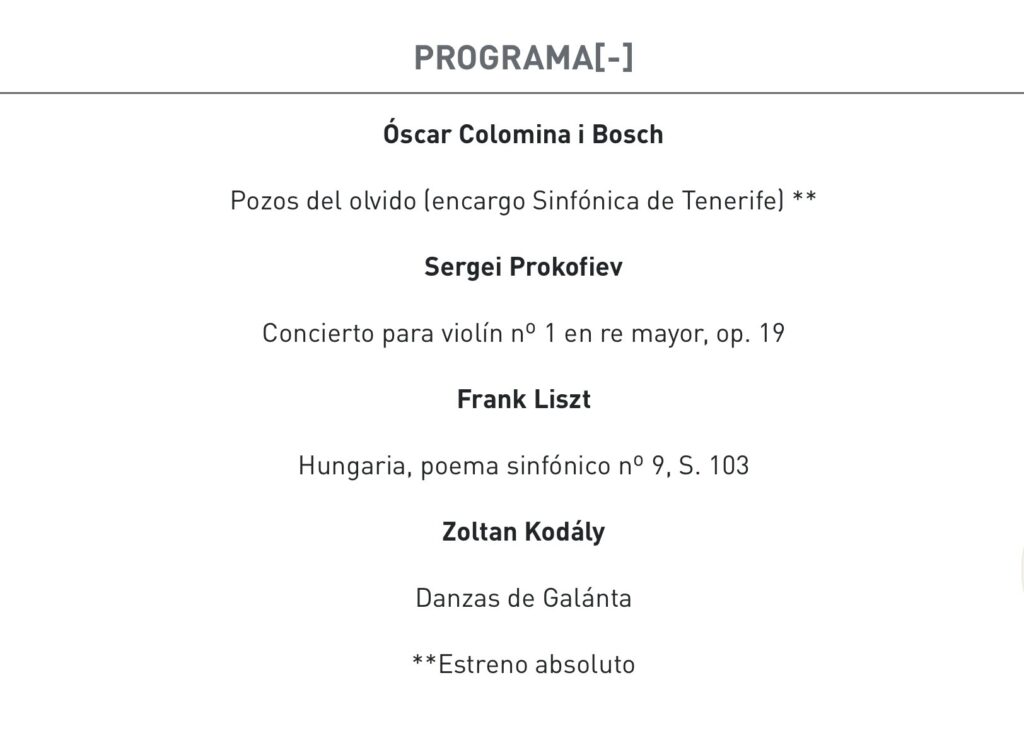Los Pozos del Olvido, a new symphonic work by Òscar will premiere in April 2026
The Symphony Orchestra of Tenerife has commissioned Òscar to write a new symphonic work, which will be premiered on the 17th of April, 2026 under the direction of Ariane Matiakh. The programme will include Prokofiev’s violin concerto nº1 with Clara-Jumi Kang as the soloist, and works by Listz and Kódaly.
This new orchestral piece will follow the premiere of VISITACION[e]S by the National Orchestra of Spain in the Auditorio Nacional, Madrid, in November 2025.
During the season launch, Chief Conductor Pablo González said ‘Òscar Colomina is a truly fascinating composer […] He has an extraordinary expressiveness and a profoundly significant emotional depth.’
Los Pozos del Olvido / Wells of Oblivion[7′-10′]
The composition of this symphonic work, which would become the second piece in a series of Myths for Orchestra exploring various mythological traditions in which water appears as a fundamental element in the transition between life and death.

The first myth for orchestra, The Styx, was commissioned by the ENSEMS Festival and premiered in September 2024 by the Orquestra de València and Baldur Brönnimann, receiving an excellent reception from both the public and critics.
The inspiration for this new orchestral work—currently in development as the second part of the Myths for orchestra series—draws from the evocative imagery and symbolism found in Chinese mythology, particularly the ancient concept of Huangquan, or the Yellow Springs. Often described as an early destination of the soul after death, the Yellow Springs are traditionally associated with wells or deep openings in the earth—geographical thresholds believed to mark entry points into the underworld. These liminal spaces, where the realms of the living and the dead intersect, offer a powerful metaphor for transition, dissolution, and transformation.
Equally compelling are other mythic elements surrounding Diyu, the Chinese underworld, where rivers and wells play essential symbolic roles. Among them is the River of Oblivion, and the Well of Oblivion, both tied to the figure of Meng Po, the mysterious old woman who offers a soup that erases the memories of souls before they begin their next life. In some versions, souls peer into the well and begin to forget—gently severing the ties to their previous existence. This act of forgetting becomes not just a loss, but a necessary passage: the need to let go of all memories before being able to be reborn.
While the Yellow Springs mark the soul’s descent, Meng Po’s well signifies preparation for return—complementary movements in the cyclical rhythm of death and renewal. Though they are not explicitly connected in traditional texts, these two images—Huangquan and the Well of Oblivion—resonate as counterparts, framing a journey that moves from the gravity of death to the lightness of forgetting.
This mythological landscape, with its rich spiritual and psychological layers, offers fertile ground for musical exploration. The resulting work will continue the cycle of Myths for Orchestra, and exploring myths of passage which have water as their liminal space.
Booking & Tickets: https://www.auditoriodetenerife.com/es/evento/danzas-de-galanta/

Press links:
Toda la Música: https://www.todalamusica.es/la-sinfonica-de-tenerife-presenta-su-temporada-2025-26-un-viaje-musical-bajo-el-lema-visionaris/
Melómano: https://www.melomanodigital.com/pablo-gonzalez-nuevo-director-principal-de-la-sinfonica-de-tenerife/

